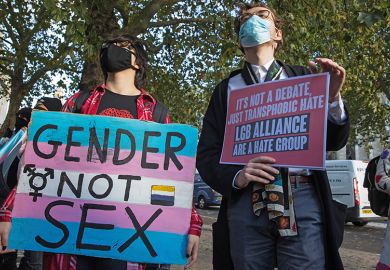The UK’s biggest academic union is set for a bitter showdown over its stance on transgender rights – as members remain locked in disputes over pay and pensions.
Critics of a motion that calls on the University and College Union to take a stand against “gender critical” feminists – those who believe it is not possible for people to change their biological sex – said that it was divisive and distracted the union from its core work of protecting workers’ rights.
But supporters said academics should be doing more to create a culture that is fully inclusive and safe for people of all genders and accused their opponents of whipping up a “culture war”.
If passed at the UCU congress in early June, the motion would mandate the union to “oppose ‘gender critics’ and transphobes ‘promoting gender ideology’ and trying to undermine trans and non-binary people’s rights”.
Holly Smith, who is coming to the end of her two-year term on UCU’s national executive committee, said that this could expose the union to legal action from those who felt discriminated against, referencing the case of Maya Forstater, who won a high court ruling in June 2021 that gender critical beliefs should be protected after her contract at the Center for Global Development, a thinktank, was not renewed.
“It is unclear what opposing feminists who take a materialist approach would look like in practice, but it certainly raises the possibility that UCU is advocating for us to be subjected to unlawful discrimination,” said Dr Smith, a lecturer in higher education at UCL.
Although the motion is yet to pass, a spokesperson for the union said that it was a “proud and unequivocal supporter of the rights of trans and non-binary people” and it “rejects wholeheartedly the attacks being launched on this community across the media and in government”. The spokesperson added that the union would “not sit idly by whilst a culture war is stoked in order to question their [transgender people’s] existence”.
The motion also resolves that the congress should congratulate the University of Sussex branch of UCU for its “solidarity” with student protests against philosopher Kathleen Stock, after she was accused of transphobia due to her views on gender. Professor Stock claimed the statement “end[ed] her career” at Sussex and later resigned.
Dr Smith said that a lesbian feminist academic losing her job shouldn’t be celebrated and that the failure of the local UCU branch to support her right to participate in public policy debates about women’s rights “sets a destructive precedent”.
“Academic freedom is a foundational value of higher education, and free speech within the law is an essential prerequisite for democratic debate,” Dr Smith said, adding that she felt trade unions were most effective when organising on the broadest basis of common interest of the membership.
The founding of the Feminist Gender Equality Network, which opposes transphobia on campuses and more broadly, is also welcomed by the motion.
The co-founders of this network, Sally Hines, chair of sociology at the University of Sheffield, and Natacha Kennedy, lecturer in education at Goldsmiths, University of London, said they were “heartened” to see the “commitment to advancing the inclusion of trans and non-binary staff and students” because the “pushback” by gender critical academics “makes trans and non-binary students vulnerable.”
“The UCU motion rightly underscores the importance of creating HE cultures that are fully inclusive and safe spaces for work and learning for people of all genders,” they added.
But Jo Phoenix, who is taking the Open University, her former employer, to an employment tribunal over claims it failed to protect her from harassment on campus because of her views on sex and gender, predicted that more academics like her would quit the union as they no longer felt it served them, speculating that it was likely some could be considering starting an alternative union.
Professor Phoenix, now professor of criminology at the University of Reading, said academic freedom was the “primary cornerstone” of what it was to be an academic and argued that it was a “sad and sorry” state of affairs that some within UCU seemed prepared – as she saw it – to sacrifice this, particularly at a time when “academics are under such attack generally and their conditions are deteriorating”.
“A trade union is meant to protect all its members’ working conditions and this importantly includes freedom from harassment on the basis of one’s political beliefs,” she added.
The UCU spokesperson said that “ministers and others should address the real problems in the sector,” rather than “pretend that defending the rights of the most marginalised constitutes a threat”.
“We are clear that the defence of trans and non-binary people is central to improving the conditions of all staff and students in post-16 education, and look forward to UCU’s 2022 congress reaffirming this position,” they added.
POSTSCRIPT:
Print headline: Trans rights debate ‘is distracting union’
Register to continue
Why register?
- Registration is free and only takes a moment
- Once registered, you can read 3 articles a month
- Sign up for our newsletter
Subscribe
Or subscribe for unlimited access to:
- Unlimited access to news, views, insights & reviews
- Digital editions
- Digital access to THE’s university and college rankings analysis
Already registered or a current subscriber?








